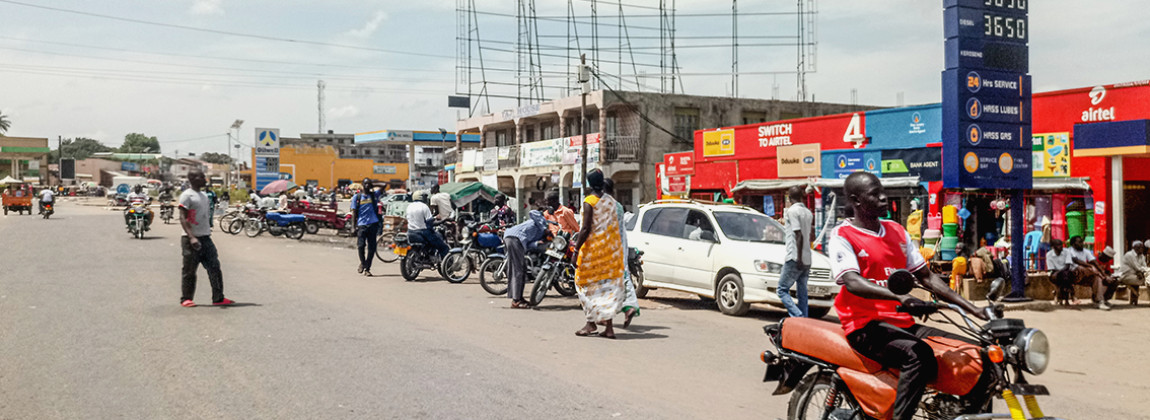- Type of project
- Applied research
- Funding
- Atlantic Fellows for Social and Economic Equity
- Website
- https://www.lse.ac.uk/geography-and-environment/research/social-media-and-the-crisis-of-urban-inequalityhttps://afsee.atlanticfellows.org/atlantic-equity-challenge
- anders.ese@aho.no
- Duration
- 01.01.2022 -> 31.12.2023
This project has been completed
About the project
Uganda is host to 1.6 million refugees, many of whom live in cities. This research project examines how young refugees and non-refugees use social media and digital communication to access jobs and make use of their urban environments. The project is a collaborative effort between The London School of Economics and Political Science (LSE), Urban-A, and OXFAM, and aims to strengthen OXFAM’s ability to communicate digitally with young urban populations in Uganda and help them access work and services.
The project in Uganda is headed by a team consisting of Dr Anders Ese (Urban-A/Guest researcher at AHO), Ida Lien (Urban-A), Joseph Mary Kasumba (OXFAM Uganda), and Winnie Munduru (OXFAM Uganda). It is part of a larger global project: Social media and the crisis of urban inequality: transnational analyses of humanitarian responses across the Middle East, South Asia and Africa, headed by principal investigator Dr Romola Sanyal (LSE), Synne Bergby (Urban-A), and Ida Lien (Urban-A), with case studies in Lebanon, India, and this project, in Uganda.
Uganda has the largest number of refugees in Africa, in addition to also having the youngest population on the continent. The role of social media as both an enabler and excluder in conditions of crises is an under-researched area with potential for policy development to improve rapid responses to shocks. Information technology shapes social relations leading to inequalities between those who have access to information and those who do not. This project will therefore examine how social media can be used to navigate the terrain between humanitarianism and inequality in Arua, a city in Northern Uganda on the border to DRC and South Sudan. The project seeks to assess and better understand how social and communications media are tools of self-organisation that help displaced and migrants living in host cities. It will seek to understand in greater detail whether information and communication can shape support and livelihoods but also whether it leads to the continued exclusion of people.
Approximately 22% of the Arua’s population are refugees or migrants (12% non-Ugandan refugees, and 10% IDPs (AVSI Foundation, Arua City and Uganda Bureau of Statistics, 2021)). Also, given Northern Uganda’s volatile history, many current residents in Arua have been refugees themselves, or are familiar with fleeing violence. Its proximity to the DRC and South Sudan borders, in addition to its new city status, makes Arua and its economic prospects an attractor to many – refugees and Ugandans alike. The city is also a major focal point for OXFAM’s work in the region, making it an ideal location for this project.
We will study the different kinds of information people access based on their socio-economic, migrant and displaced backgrounds, and how that links with information and support provided by humanitarian actors and local authorities. At the overarching level the project will seek to answer the following questions:
- How does different information available to people during humanitarian crises affect their access to shelter, livelihoods, and other necessities in cities?
- How is this a product of, and how does it contribute to the inequalities and social divisions experienced by displaced and migrant populations?
- How do we collect, process, and analyse information in ways that provides quicker, more accurate and operational data for immediate to long-term responses?
- Can we connect innovation in technology and information processing to ensure that analysis and response contributes to more inclusive recovery and long-term objectives of equality?
The project was awarded funding by Atlantic Fellows for Social and Economic Equity through the Atlantic Equity Challenge, aimed at supporting work that lies at the intersection of research and practice, and that can offer valuable insights into alternatives and solutions that reduce inequality, rather than focusing solely on its causes and consequences. The Atlantic Fellows for Social and Economic Equity programme is based at the International Inequalities Institute at the London School of Economics and Political Science. The programme works towards social and economic justice for all by drawing on the insights of academic research, innovative social change strategies, as well as the Fellows’ own experience and expertise. It seeks to empower a new generation of change-makers, including policy-makers, activists, researchers, practitioners and campaigners, to work together across disciplines, backgrounds and borders. Its aim is to deepen the knowledge and practical skills that Fellows need to envision and explore alternatives to the world’s deeply unequal economic, political, legal and social structures.
Image: Sandra Aceng/CC BY-SA 4.0





